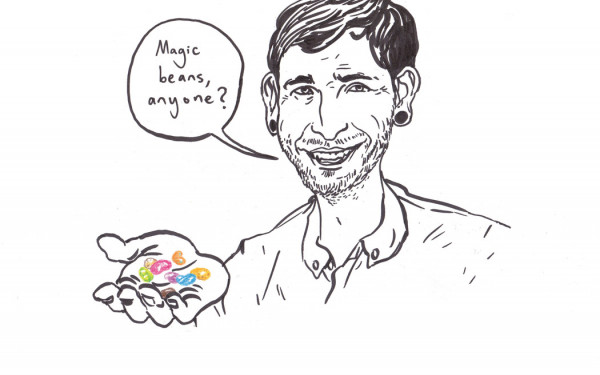Do Undergrads Want to Use Student Centre Fund for Food Co-Ops?
Vote on Using Student Space Fund for Food-System Projects in Upcoming CSU Elections
The subject of fee levies has featured prominently thus far in this year’s CSU elections campaign, but they won’t be the only funds being voted on when students head to the polls next week.
Following a petition presented to CSU chairperson Nick Cuillerier at the union’s council meeting on Feb. 12, students will be asked whether they approve of using a portion of the Student Space, Accessible Education and Legal Contingency Fund “for the creation and expansion of predominantly student-run food system projects on campus.”
“The Student Space, Accessible Education and Legal Contingency Fund has been accumulating for almost 10 years now at a rate of roughly 1 million every year,” said arts and science councillor Gabriel Velasco, who presented the petition to council with two other students. “Utilizing this fund to develop a food system whose sole purpose is to benefit the entire Concordia community is undoubtedly the responsible use of student money.”
According to CSU chief executive officer Andre-Marcel Baril, there is no official “no” campaign on the referendum question.
Among those supporting the “yes” side is the Community Matters CSU elections team—for which Velasco is running as VP Loyola—which published a blog post devoted to the issue March 12. In it, the team lays out its plans for the fund if the referendum question passes.
“With this policy in place, an application process specifically related to food-systems projects would be developed for the fund,” reads the post. The post then breaks the process down into two tiers: project development, which includes funding for location analysis, and project execution, which includes funding for a project manager.
Debate over whether the fund should be used for food-system projects first surfaced when Velasco, who is also a member of the Concordia Food Coalition, suggested at the CSU’s Referendum Oversight Committee meeting in January to use money from the fund to pay for a project manager to oversee the creation of a co-operative board governing both the as-of-yet unopened Hive Café and the student-run café set to replace the Hall Building Java U.
Incumbent VP Finance Scott Carr answered Velasco’s suggestion by stating that the fund “can only be used for the improvement of student space,” according to the ROC report.
“If a project manager is hired to create the business model and oversee the project that would not necessarily fit within the fund’s acceptable usage guidelines,” reads the report.
Incumbent CSU VP Sustainability Benjamin Prunty, who is running for president under the Community Matters banner, told The Link last month that he disagrees with that assessment.
“The important question to ask […] is: is a student café a student space? Of course it is. Is putting a co-operative into the mezzanine space considered an improvement to student space? Since students voted 9-1 in favour of putting a co-operative in there, I’d say it is pretty clear they consider it an improvement,” he said.
Carr told The Link last month that in any case, the money from the SSAELC fund “is not available for projects currently due to circumstances beyond the CSU’s control,” but did not elaborate on what those circumstances are.
Carr, who is running for VP Finance under the Experience CSU banner in the upcoming elections, refused to comment on the referendum question at this time.
Officially, the bylaw regarding the SSAELC fund states that the fund’s money may be used to “improve the facilities available to students for use as student spaces.”
Velasco admitted that the fund was originally intended to eventually purchase a student union building, but as he noted, “This was almost 10 years ago, and on both occasions in which students were consulted in a referendum process over the acquisition of a student union building, they overwhelmingly rejected the idea.”
“Utilizing small portions of this fund for student space and student-run food-system projects will not significantly impact its ability to be used for a student union building in the future,” he added.
Ultimately, for Velasco—and the rest of the Community Matters team—it’s obvious how students should vote when they’ll get the chance to do so March 25-March 27.
“[Using the SSAELC fund to develop student-run food systems on campus] would give the opportunity to facilities, groups, associations and students to actually put this fund to good use to the benefit of all students across all of Concordia’s communities,” said Velasco.

_900_597_90.jpg)
_600_832_s.png)


_600_375_90_s_c1.jpg)